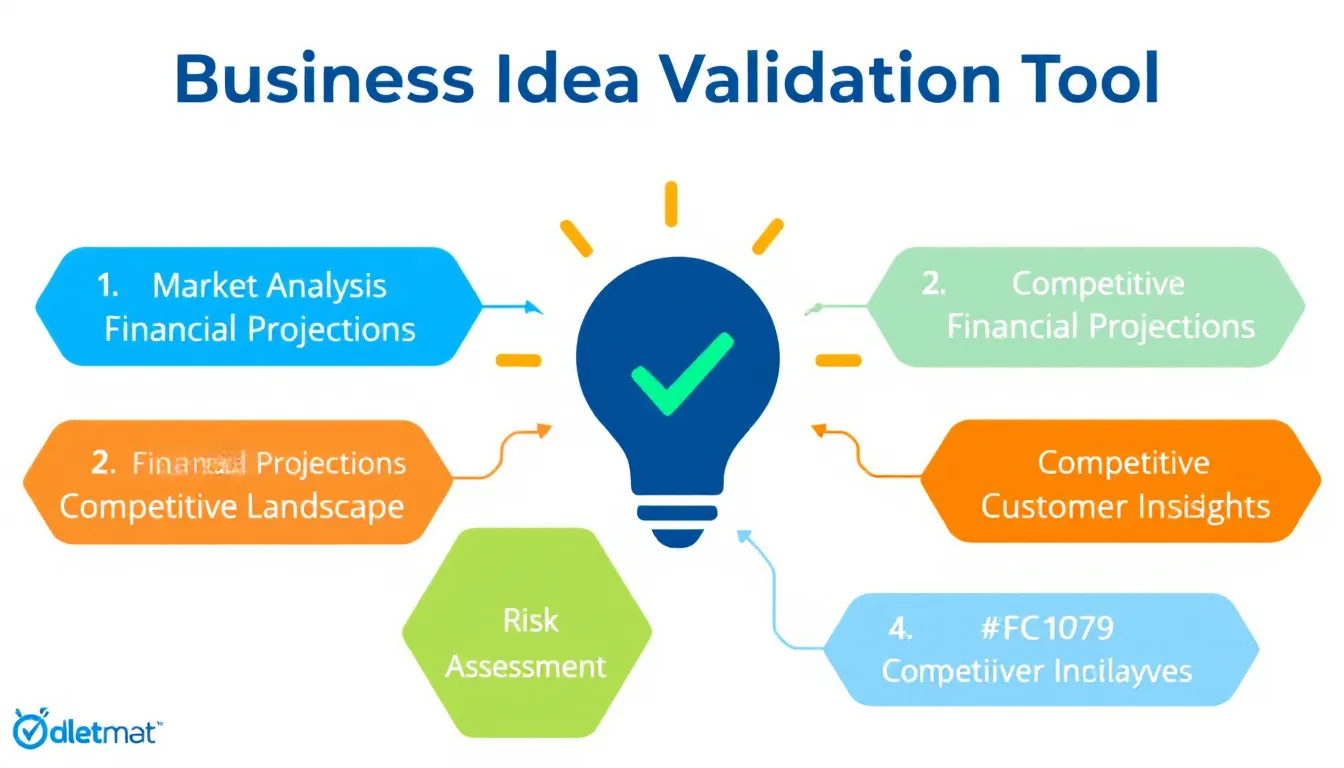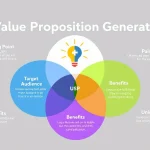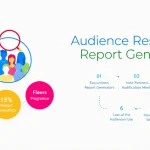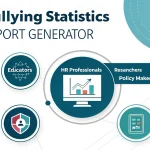Business Idea Validation
Is this tool helpful?
How to Use the Business Idea Validation Tool Effectively
To make the most of our Business Idea Validation Tool, follow these steps:
- Detailed Business Idea Description: In the first field, provide a comprehensive description of your business idea. For example, “A subscription-based pet care service that offers monthly deliveries of personalized pet food, toys, and grooming supplies based on the pet’s breed, age, and health conditions.”
- Target Market: Define your target audience clearly. For instance, “Pet owners aged 25-45 in urban areas who prioritize convenience and high-quality pet care.”
- Industry or Sector: Specify the industry your idea belongs to. Example: “Pet care, E-commerce, Subscription services.”
- Unique Value Proposition: Articulate what makes your idea stand out. For example, “Personalized pet care solutions delivered to your doorstep, tailored to your pet’s specific needs and preferences.”
- Competitor Information: If known, provide details about existing competitors. For instance, “Chewy.com offers pet supplies online, but doesn’t provide personalized monthly subscriptions.”
- Estimated Startup Costs: If you have an estimate, enter it here. For example, “150000” for $150,000 initial investment.
- Submit for Validation: Click the “Validate Business Idea” button to receive a comprehensive analysis.
After submission, our AI-powered tool will process your input and generate a detailed validation report. This report will appear below the form, providing insights into market potential, competitive landscape, financial projections, and strategic recommendations.
Understanding the Business Idea Validation Tool
Our Business Idea Validation Tool is a cutting-edge solution designed to help entrepreneurs, startups, and established businesses evaluate the viability and potential of new business concepts. By leveraging advanced algorithms and comprehensive market data, this tool provides a robust analysis that can guide decision-making and strategic planning.
Purpose and Benefits
The primary purpose of this tool is to offer a structured, data-driven approach to assessing business ideas. It aims to:
- Minimize risk by identifying potential challenges and opportunities early in the planning process
- Save time and resources by providing a quick, comprehensive analysis
- Offer objective insights based on market trends and data
- Guide strategic decision-making with actionable recommendations
- Increase the chances of success by highlighting areas for improvement or focus
Key Components of the Analysis
The Business Idea Validation Tool conducts a multi-faceted analysis, including:
- Market Research: Evaluating the size, growth potential, and trends in the target market
- Competitive Analysis: Identifying key competitors and assessing their strengths and weaknesses
- Financial Projections: Estimating potential revenue, costs, and profitability
- SWOT Analysis: Assessing Strengths, Weaknesses, Opportunities, and Threats
- Unique Value Proposition (UVP) Assessment: Evaluating the distinctiveness and appeal of the business idea
- Scalability Analysis: Assessing the potential for growth and expansion
- Strategic Recommendations: Providing actionable insights for implementation and improvement
Benefits of Using the Business Idea Validation Tool
1. Data-Driven Decision Making
One of the primary advantages of using our Business Idea Validation Tool is the ability to make decisions based on data rather than intuition alone. While entrepreneurial instinct is valuable, combining it with concrete data and analysis can significantly increase the chances of success. The tool processes vast amounts of market data, consumer trends, and industry insights to provide a comprehensive view of your business idea’s potential.
2. Time and Cost Efficiency
Conducting thorough market research and business analysis can be a time-consuming and expensive process. Our tool streamlines this process, providing a comprehensive report in a fraction of the time it would take to conduct manual research. This efficiency allows entrepreneurs to:
- Quickly iterate on their ideas
- Test multiple concepts without significant time investment
- Allocate resources more effectively in the early stages of business planning
3. Objective Perspective
Entrepreneurs often become emotionally attached to their ideas, which can lead to biased assessments. The Business Idea Validation Tool offers an impartial, data-driven evaluation, helping to:
- Identify potential blind spots in the business plan
- Challenge assumptions about the market or target audience
- Provide a reality check on financial projections and market potential
4. Comprehensive Market Insights
The tool provides in-depth market insights that might be difficult or costly to obtain through traditional research methods. These insights include:
- Market size and growth projections
- Consumer behavior trends
- Competitive landscape analysis
- Regulatory considerations
- Technological trends impacting the industry
5. Risk Mitigation
By identifying potential challenges and obstacles early in the planning process, the Business Idea Validation Tool helps entrepreneurs mitigate risks. It allows for:
- Proactive problem-solving
- Development of contingency plans
- Adjustment of business strategies to address potential weaknesses
6. Enhanced Investor Appeal
For entrepreneurs seeking funding, the validation report generated by our tool can significantly enhance the appeal to potential investors. It demonstrates:
- A data-driven approach to business planning
- Thorough market understanding
- Realistic financial projections
- Awareness of potential challenges and strategies to overcome them
7. Customized Strategic Recommendations
Based on the analysis, the tool provides tailored strategic recommendations. These insights can guide entrepreneurs in:
- Refining their business model
- Developing effective marketing strategies
- Identifying key performance indicators (KPIs) for success
- Planning for scalability and growth
Addressing User Needs and Solving Specific Problems
Tackling Uncertainty in Business Planning
One of the most significant challenges entrepreneurs face is uncertainty about the viability of their business ideas. Our Business Idea Validation Tool directly addresses this problem by providing a structured analysis based on real market data. For example, if an entrepreneur is considering launching a new fitness app, the tool might reveal:
- Market saturation in general fitness apps
- Growing demand for niche fitness solutions (e.g., for seniors or post-injury recovery)
- Potential partnerships with healthcare providers or insurance companies
This information allows the entrepreneur to refine their idea, perhaps pivoting to a more specific niche with higher potential for success.
Overcoming Limited Market Knowledge
Many entrepreneurs have great ideas but limited knowledge of their target market. Our tool bridges this gap by providing comprehensive market insights. For instance, consider an entrepreneur planning to open a vegan restaurant in a mid-sized city. The tool might provide the following insights:
- 20% year-over-year growth in demand for vegan dining options in the area
- Underserved lunch crowd in the business district
- Growing trend of vegan catering for corporate events
Armed with this information, the entrepreneur can tailor their business plan to capitalize on these opportunities, perhaps by focusing on quick lunch options and developing a corporate catering arm.
Financial Projection Challenges
Accurate financial projections are crucial but often challenging for new businesses. Our tool addresses this by providing data-driven estimates based on market trends and comparable businesses. For example, for a proposed e-commerce store selling handmade jewelry, the tool might generate the following projections:
- Estimated first-year revenue: $120,000
- Projected growth rate: 30% year-over-year for the first three years
- Average customer acquisition cost: $25
- Estimated profit margin: 45% after accounting for materials, labor, and overhead
These projections provide a realistic baseline for financial planning, helping entrepreneurs avoid overly optimistic or pessimistic estimates.
Identifying Competitive Advantages
In crowded markets, identifying and leveraging competitive advantages is crucial. Our tool helps entrepreneurs pinpoint what makes their idea unique and how to capitalize on it. For instance, for a proposed eco-friendly cleaning service, the tool might highlight:
- Growing consumer preference for environmentally friendly services
- Lack of established eco-friendly competitors in the local market
- Potential for premium pricing based on the unique value proposition
This information enables the entrepreneur to develop a marketing strategy that emphasizes their eco-friendly credentials and justifies premium pricing.
Scalability Assessment
Understanding the potential for growth and scalability is vital for long-term success. Our tool provides insights into scalability factors. For example, for a custom software development company, the analysis might reveal:
- High demand for industry-specific software solutions
- Opportunity to develop proprietary tools that can be licensed
- Potential for expanding into international markets with minimal additional investment
These insights can guide the company’s long-term strategy, encouraging investment in proprietary tool development and planning for international expansion.
Practical Applications and Use Cases
Case Study 1: E-learning Platform for Professional Skills
An entrepreneur approached our tool with an idea for an e-learning platform focused on teaching professional skills like public speaking, negotiation, and leadership. After inputting the details, the Business Idea Validation Tool provided the following insights:
- Market Analysis: The e-learning market is growing at 14% annually, with professional skills being one of the fastest-growing segments.
- Competitive Landscape: While there are established players like Coursera and Udemy, there’s a gap for a platform specializing exclusively in professional soft skills.
- Financial Projections: Estimated first-year revenue of $500,000 with a 25% year-over-year growth rate for the next five years.
- Unique Value Proposition: The focus on interactive, scenario-based learning for soft skills could be a significant differentiator.
Based on these insights, the entrepreneur refined their business plan, focusing on developing proprietary interactive learning modules and partnering with industry experts for content creation. The platform launched successfully and achieved profitability within 18 months.
Case Study 2: Sustainable Fashion Rental Service
A group of fashion enthusiasts used our tool to validate their idea for a sustainable fashion rental service targeting millennials and Gen Z. The tool provided the following analysis:
- Market Trend: Growing concern for sustainability in fashion, with 73% of millennials willing to pay more for sustainable products.
- Competitive Analysis: Few direct competitors in the sustainable rental space, but strong indirect competition from fast fashion retailers.
- Financial Insight: Projected break-even point at 18 months with an initial investment of $300,000.
- Scalability: High potential for expansion into multiple cities and potential for white-label services for fashion brands.
Using these insights, the team adjusted their business model to include partnerships with sustainable fashion brands and developed a marketing strategy emphasizing the environmental impact of their service. They successfully secured seed funding and launched in three major cities within their first year.
Case Study 3: AI-Powered Personal Finance Assistant
A fintech startup used our Business Idea Validation Tool to assess their concept for an AI-powered personal finance assistant. The tool provided the following feedback:
- Market Opportunity: Growing demand for personalized financial advice, with 67% of millennials preferring digital financial solutions.
- Regulatory Considerations: Highlighted the need for compliance with financial regulations and data protection laws.
- Technical Feasibility: Indicated a high initial development cost but long-term cost efficiency through AI automation.
- Revenue Model: Suggested a freemium model with premium features for advanced financial planning and investment advice.
Based on this analysis, the startup refined their product roadmap, prioritizing essential features for the MVP (Minimum Viable Product) and planning for gradual introduction of advanced AI capabilities. They also allocated resources for legal compliance and data security. The app launched successfully and gained 100,000 users within the first six months.
Case Study 4: Niche Travel Experience Curator
An experienced traveler used our tool to validate her idea for a niche travel experience company focusing on immersive cultural experiences in lesser-known destinations. The tool provided these insights:
- Target Market: Growing segment of experiential travelers willing to pay premium for unique, authentic experiences.
- Operational Challenges: Highlighted the need for strong local partnerships and quality control measures.
- Marketing Strategy: Recommended focusing on content marketing and influencer partnerships to showcase unique experiences.
- Scalability: Suggested a phased approach, starting with 3-5 destinations and gradually expanding.
Equipped with this information, the entrepreneur developed a detailed business plan, focusing on building a network of local experience providers and creating a strong brand identity around authentic travel experiences. The company launched successfully, offering experiences in three destinations, and plans to expand to ten destinations within three years.
Frequently Asked Questions (FAQ)
1. How accurate is the Business Idea Validation Tool?
The Business Idea Validation Tool provides insights based on current market data, trends, and analytical models. While it offers valuable guidance, it’s important to remember that market conditions can change, and success ultimately depends on execution. We recommend using the tool’s insights as a starting point for further research and planning.
2. Can I use this tool for multiple business ideas?
Absolutely! You can use the Business Idea Validation Tool for as many ideas as you like. In fact, we encourage entrepreneurs to test multiple concepts or variations of their ideas to identify the most promising opportunities.
3. Does the tool provide funding or connect me with investors?
While the Business Idea Validation Tool doesn’t directly provide funding or investor connections, the report it generates can be a valuable asset when approaching potential investors. It demonstrates that you’ve done your due diligence and have a data-backed understanding of your business concept’s potential.
4. How often should I revalidate my business idea?
Market conditions and consumer preferences can change rapidly. We recommend revalidating your business idea periodically, especially if you’re in the planning stages. For established businesses, consider running a validation check annually or whenever you’re planning significant pivots or expansions.
5. Can the tool help with pricing strategies?
While the Business Idea Validation Tool doesn’t set specific prices, it provides market insights and competitive analysis that can inform your pricing strategy. The financial projections and market positioning information can be particularly helpful in determining appropriate price points.
6. Is the tool suitable for all types of businesses?
The Business Idea Validation Tool is designed to accommodate a wide range of business types, from product-based to service-oriented, and from local small businesses to scalable tech startups. However, the depth and specificity of insights may vary depending on the availability of data for your particular industry or niche.
7. How does the tool handle innovative or unique business ideas?
For highly innovative or unique ideas, the tool analyzes adjacent markets, related trends, and potential use cases to provide relevant insights. While direct comparisons might be limited for truly novel concepts, the tool can still offer valuable information on market readiness, potential challenges, and opportunities.
8. Can the tool help me refine my target market?
Yes, the Business Idea Validation Tool can provide insights into potential target markets based on your business idea. It might identify underserved segments or suggest focusing on specific demographics that are more likely to be receptive to your product or service.
9. Does the tool consider regional or local market differences?
The tool takes into account regional and local market factors when applicable. For businesses with a specific geographical focus, it’s important to provide this information in the input fields to receive more relevant and localized insights.
10. How can I best prepare to use the Business Idea Validation Tool?
To get the most out of the tool, come prepared with a clear description of your business idea, any research you’ve already conducted, and specific questions or areas of concern you want to address. The more detailed and thoughtful your input, the more valuable and tailored the resulting analysis will be.
Important Disclaimer
The calculations, results, and content provided by our tools are not guaranteed to be accurate, complete, or reliable. Users are responsible for verifying and interpreting the results. Our content and tools may contain errors, biases, or inconsistencies. We reserve the right to save inputs and outputs from our tools for the purposes of error debugging, bias identification, and performance improvement. External companies providing AI models used in our tools may also save and process data in accordance with their own policies. By using our tools, you consent to this data collection and processing. We reserve the right to limit the usage of our tools based on current usability factors. By using our tools, you acknowledge that you have read, understood, and agreed to this disclaimer. You accept the inherent risks and limitations associated with the use of our tools and services.







